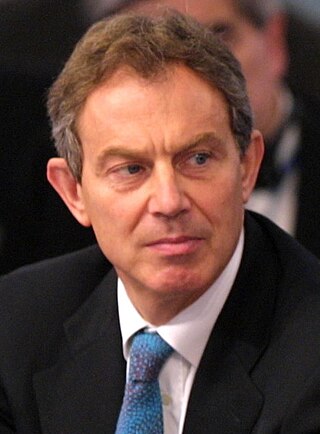
The 2001 United Kingdom general election was held on Thursday 7 June 2001, four years after the previous election on 1 May 1997, to elect 659 members to the House of Commons. The governing Labour Party led by the prime minister Tony Blair was re-elected to serve a second term in government with another landslide victory with a 165-seat majority, returning 412 members of Parliament versus 418 from the previous election, a net loss of six seats, although with a significantly lower turnout than before—59.4%, compared to 71.6% at the previous election.
The Conservative and Unionist Party, commonly the Conservative Party and colloquially known as the Tories, is one of the two main political parties in the United Kingdom, along with the Labour Party. It has been the Official Opposition since being defeated in the 2024 general election. The party sits on the right-wing to centre-right of the political spectrum. It encompasses various ideological factions including one-nation conservatives, Thatcherites, and traditionalist conservatives. There have been twenty Conservative prime ministers.

The Evening Standard, formerly The Standard (1827–1904), is a long-established newspaper, since 2009, a local free newspaper in tabloid format, with a website on the Internet, published and distributed in London, England.

The Financial Times (FT) is a British daily newspaper printed in broadsheet and also published digitally that focuses on business and economic current affairs. Based in London, the paper is owned by a Japanese holding company, Nikkei, with core editorial offices across Britain, the United States and continental Europe. In July 2015, Pearson sold the publication to Nikkei for £844 million after owning it since 1957. In 2019, it reported one million paying subscriptions, three-quarters of which were digital subscriptions. In 2023, it was reported to have 1.3 million subscribers of which 1.2 million were digital. The newspaper has a prominent focus on financial journalism and economic analysis rather than generalist reporting, drawing both criticism and acclaim. It sponsors an annual book award and publishes a "Person of the Year" feature.

The Daily Mirror is a British national daily tabloid newspaper. Founded in 1903, it is owned by parent company Reach plc. From 1985 to 1987, and from 1997 to 2002, the title on its masthead was simply The Mirror. It had an average daily print circulation of 716,923 in December 2016, dropping to 587,803 the following year. Its Sunday sister paper is the Sunday Mirror. Unlike other major British tabloids such as The Sun and the Daily Mail, the Mirror has no separate Scottish edition; this function is performed by the Daily Record and the Sunday Mail, which incorporate certain stories from the Mirror that are of Scottish significance.
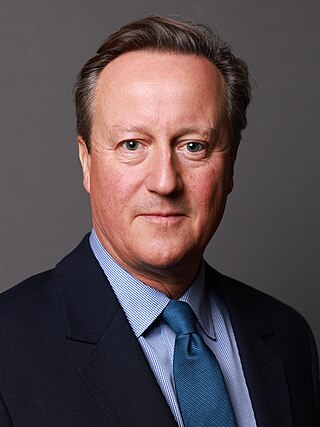
David William Donald Cameron, Baron Cameron of Chipping Norton, is a British politician who served as Prime Minister of the United Kingdom from 2010 to 2016 and latterly as Foreign Secretary under Rishi Sunak from November 2023 to July 2024. Cameron was Leader of the Conservative Party from 2005 to 2016. He was Leader of the Opposition from 2005 to 2010 and Member of Parliament (MP) for Witney from 2001 to 2016. Cameron identifies as a one-nation conservative and has been associated with both economically liberal and socially liberal policies.
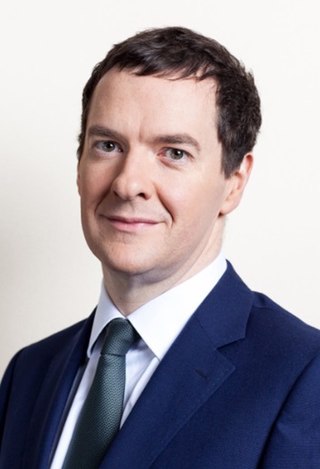
George Gideon Oliver Osborne is a British retired politician and newspaper editor who served as Chancellor of the Exchequer from 2010 to 2016 and as First Secretary of State from 2015 to 2016 in the Cameron government. A member of the Conservative Party, he was Member of Parliament (MP) for Tatton from 2001 to 2017.
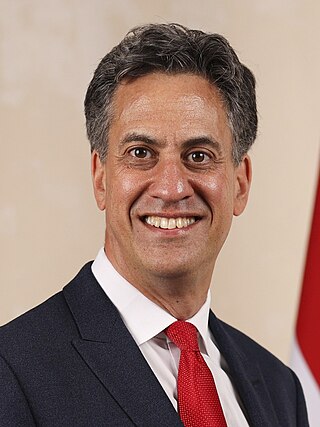
Edward Samuel Miliband is a British politician who has served as Secretary of State for Energy Security and Net Zero since July 2024. He has been Member of Parliament (MP) for Doncaster North since 2005. Miliband was Leader of the Labour Party and Leader of the Opposition between 2010 and 2015. Alongside his brother, Foreign Secretary David Miliband, he served in the Cabinet from 2007 to 2010 under Prime Minister Gordon Brown.

The 2010 United Kingdom general election was held on Thursday 6 May 2010, to elect Members of Parliament to the House of Commons. The election took place in 650 constituencies across the United Kingdom under the first-past-the-post system. The election resulted in a large swing to the opposition Conservative Party led by David Cameron similar to that seen in 1979, the last time a Conservative opposition had ousted a Labour government. The governing Labour Party led by the prime minister Gordon Brown lost the 66-seat majority it had previously enjoyed, but no party achieved the 326 seats needed for a majority. The Conservatives won the most votes and seats, but still fell 20 seats short. This resulted in a hung parliament where no party was able to command a majority in the House of Commons. This was only the second general election since the Second World War to return a hung parliament, the first being the February 1974 election. This election marked the start of Conservative government for the next 14 years.

Stewart James Jackson, Baron Jackson of Peterborough is a British politician and adviser. Jackson served as a Conservative Member of Parliament (MP) for Peterborough from 2005 to 2017. After being ousted by Labour's Fiona Onasanya at the 2017 general election, he served as Chief of Staff, and Special Adviser to David Davis, Secretary of State for Exiting the European Union, until July 2018 when Davis resigned his position. He was made a member of the House of Lords as a life peer in November 2022.

Grant Shapps is a British politician who served as Secretary of State for Defence from August 2023 to July 2024. Shapps previously served in various cabinet posts, including Conservative Party Co-Chairman, Transport Secretary, Home Secretary, Business Secretary, and Energy Secretary under Prime Ministers David Cameron, Boris Johnson, Liz Truss and Rishi Sunak. A member of the Conservative Party, he served as the Member of Parliament (MP) for Welwyn Hatfield from 2005 to 2024. He failed to be re-elected as his constituency's MP in the 2024 general election.

John Douglas Wilson Carswell is a British former politician who served as a Member of Parliament from 2005 to 2017, co-founded Vote Leave and currently serves as president and CEO of the Mississippi Center for Public Policy.

This article concerns the policies, views and voting record of David Cameron, former Prime Minister of the United Kingdom and former Foreign Secretary in the Sunak ministry. Cameron describes himself as a "modern compassionate conservative" and has said that he is "fed up with the Punch and Judy politics of Westminster". He has stated that he is "certainly a big Thatcher fan, but I don't know whether that makes me a Thatcherite." Our Society, Your Life, a 2007 policy statement for the Conservative Party launched shortly after David Cameron became leader of the party, has been seen by some as a triangulation of Conservative ideology with that of Tony Blair's New Labour, linking into the idea of the Third Way and an attempted revival of one-nation conservatism. There have been claims that he described himself to journalists at a dinner during the leadership contest as the "Heir to Blair", and Cameron stated in 2005 that he did not intend to oppose the Labour government as a matter of course, and will offer his support in areas of agreement. He also wants to move the Conservatives focus away from purely fiscal matters, saying "It's time we admitted that there's more to life than money, and it's time we focused not just on GDP, but on GWB – general well-being". However, commentators have questioned the degree to which Cameron and his coalition have embodied this, instead locating them in the intellectual tradition of Thatcherism. However, Cameron has claimed to be a "liberal Conservative", and "not a deeply ideological person".
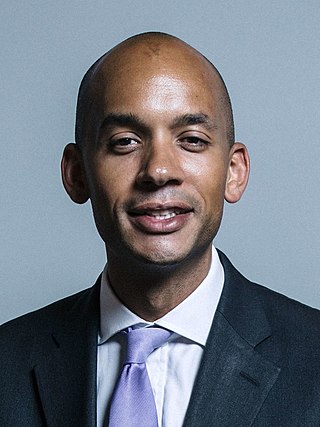
Chuka Harrison Umunna is a British businessman and former politician who served as Member of Parliament (MP) for Streatham from 2010 until 2019. A former member of the Labour Party, he was part of the Shadow Cabinet from 2011 to 2015. He left Labour in February 2019, when he resigned to form The Independent Group, later Change UK, along with six other MPs. Later in 2019, he left Change UK and, after a short time as an independent MP, joined the Liberal Democrats. In the 2019 general election, he failed to be re-elected, and did not return to the House of Commons.

The United Kingdom Alternative Vote referendum, also known as the UK-wide referendum on the Parliamentary voting system was held on Thursday 5 May 2011 in the United Kingdom to choose the method of electing MPs at subsequent general elections. It occurred as a provision of the Conservative–Liberal Democrat coalition agreement drawn up in 2010 and also indirectly in the aftermath of the 2009 expenses scandal. It operated under the provisions of the Parliamentary Voting System and Constituencies Act 2011 and was the first national referendum to be held under provisions laid out in the Political Parties, Elections and Referendums Act 2000. Many local elections were also held on this day.
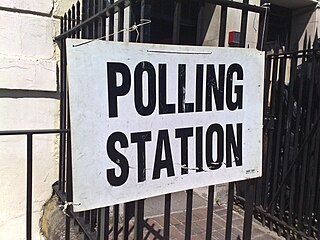
The events surrounding the formation of the United Kingdom's government in 2010 took place between 7 May and 12 May 2010, following the 2010 general election, which failed to produce an overall majority for either of the country's two main political parties. The election, held on 6 May, resulted in the first hung parliament in the UK in 36 years, sparking a series of negotiations which would form the first coalition government since the Second World War.

The 2015 United Kingdom general election was held on Thursday 7 May 2015 to elect 650 Members of Parliament (MPs) to the House of Commons. It was the first of three general elections to be held under the rules of the Fixed-term Parliaments Act 2011 and was the last general election to be held before the United Kingdom voted to end its membership of the European Union (EU) in June 2016. Local elections took place in most areas of England on the same day and is to date the most recent general election to coincide with local elections. The governing Conservative Party, led by Prime Minister David Cameron, won an unexpected victory; opinion polls and political commentators had predicted that the results of the election would cause a second consecutive hung parliament whose composition would be similar to the previous Parliament, which was in effect from the previous national election in 2010. However, opinion polls underestimated the Conservatives, as they won 330 of the 650 seats and 36.9 per cent of the votes, giving them a majority of ten seats.
Various newspapers, organisations and individuals endorsed parties or individual candidates for the 2015 general election

The 2017 United Kingdom general election was held on Thursday 8 June 2017, two years after the previous general election in 2015; it was the first since 1992 to be held on a day that did not coincide with any local elections. The governing Conservative Party led by the prime minister Theresa May remained the largest single party in the House of Commons but lost its small overall majority, resulting in the formation of a Conservative minority government with a confidence and supply agreement with the Democratic Unionist Party (DUP) of Northern Ireland.

The 2019 United Kingdom general election was held on Thursday, 12 December 2019, with 47,567,752 registered voters entitled to vote to elect 650 Members of Parliament (MPs) to the House of Commons. The governing Conservative Party led by the prime minister, Boris Johnson, won a landslide victory with a majority of 80 seats, a net gain of 48, on 43.6 per cent of the popular vote, the highest percentage for any party since the 1979 general election, though with a narrower popular vote margin than that achieved by the Labour Party over the Conservatives at the 1997 general election. This was the second national election to be held in 2019 in the United Kingdom, the first being the 2019 European Parliament election.
















